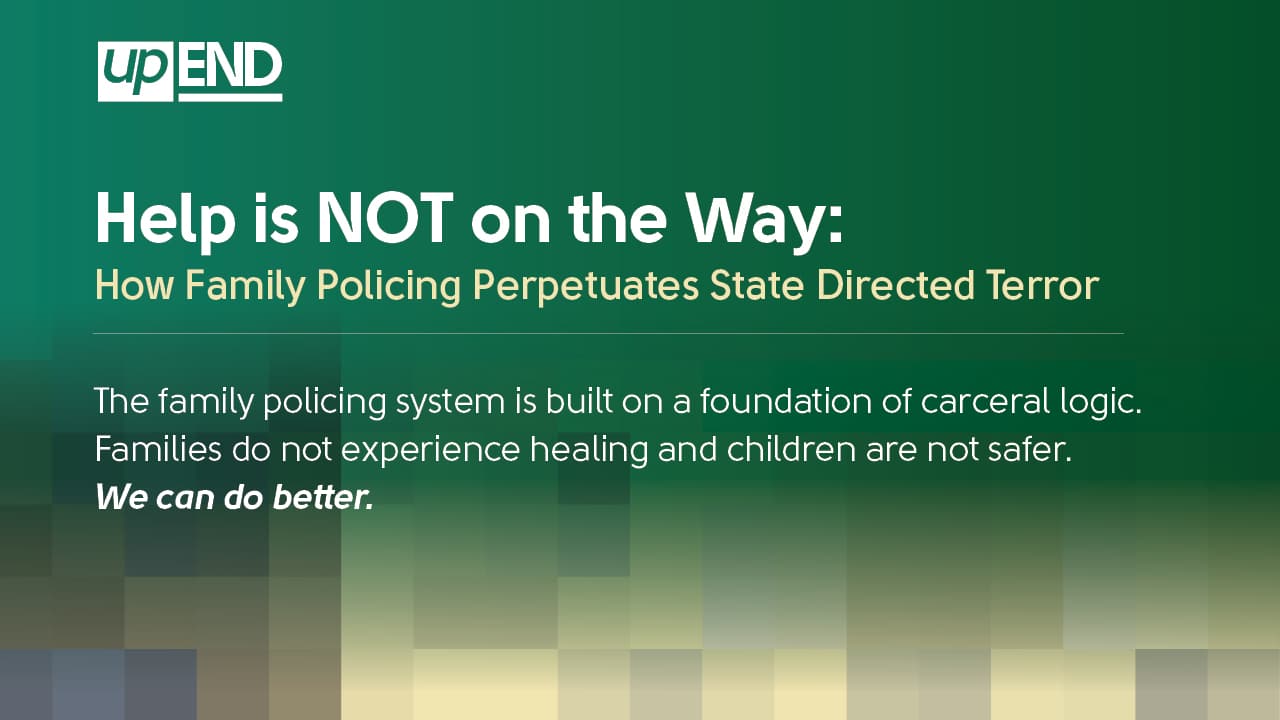Resources for “Help is NOT on the Way: How Family Policing Perpetuates State Directed Terror”
Carceral Logic Resources
Katherine Beckett & Naomi Murakawa, Mapping the Shadow Carceral State: Toward an Institutionally Capacious Approach to Punishment
Michael Coyle & Mechthild Nagel (Eds.), Contesting Carceral Logic: Toward Abolitionoist Futures
Michael Foucault, Discipline and Punish: The Birth of the Prison
Issa Kohler-Hausmann, Misdemeanorland: Criminal Courts and Social Control In an Age of Broken Windows Policing
Erica Meiners, Trouble with the Child in the Carceral State
Beth Richie & Kayla Martensen, Resisting Carcerality, Embracing Abolition: Implications for Feminist Social Work Practice
Maya Schenwar & Victoria Law, Prison by Any Other Name
Vesla Weaver & Amy Lerman, Political Consequences of the Carceral State
Ruth Wilson Gilmore, Golden Gulag
The following stories of families impacted by family policing intervention provide examples of how carceral logic manifests in ways that surveil, regulate, and punish families.
In the Child Welfare System, Black Families Should Matter
How the Child Welfare System Is Silently Destroying Black Families
Study finds ‘extreme’ racial disparities in DCS cases, Phoenix family says they were ‘stereotyped’
‘American Idol’ star Syesha Mercado fights for son’s custody over claims of malnutrition
Parents Threatened with Losing Children Over Cannabis Use
Parents who kept kids at home for fear of Covid are reported for neglect
A Father’s Year Long Struggle to Regain Custody of His Son
How Minnesota’s Foster System Reminds Native Moms of a Racist Legacy
Minnesota foster care system perpetuates legacy of racist boarding schools, Native mothers say
Surveillance Resources
Khadijah Abdurahman, Calculating the Souls of Black Folk: Predictive Analytics in the New York City Administration for Children’s Services
Simone Browne, Dark Matters: On the Surveillance of Blackness
Moon Kie Jung & João Costa Vargas, Antiblackness
David Lyon, Technology vs. ‘Terrorism’: Circuits of City Surveillance Since September 11th
Gary Marx, Surveillance and Society
Sheyla Medina, Katherine Sell, Jane Kavanagh, Cara Curtis, & Joanne Wood, Tracking Child Abuse and Neglect: The Role of Multiple Data Sources in Improving Child Safety
Dorothy Roberts, Shattered Bonds: The Color of Child Welfare
Zoé Samudzi & William Anderson, As Black as Resistance: Finding the Conditions for Liberation
Regulation Resources
Elizabeth Brico, How child protective services can skip due process.
Marilyn Brown & Barbara Bloom, Colonialism and motherhood: Native Hawaiian families under corrections and child welfare control.
Kelley Fong, Concealment and constraint: Child protective services fears and poor mothers institutional engagement.
Movement for Family Power, “Whatever they do, I’m her comfort, I’m her protector.” How the foster system has become ground zero for the U.S. drug war.
Emma Peyton Williams, ‘Family Regulation,’ not ‘Child Welfare’: Abolition Starts with Changing Our Language.
Emma Peyton Williams, Dreaming of Abolitionist Futures, Reconceptualizing Child Welfare: Keeping Kids Safe in the Age of Abolition
Punishment Resources
Autumn Brown, adrienne marie brown, & Mariame Kaba, The practices we need: #MeToo and transformative justice in We do this ‘til we free us: Abolitionist organizing and transforming justice
Ta-Nehisi Coates, A Case for reparations.
Brianna Harvey & Kenyon Lee Whitman, Child welfare and a just future: From a moment to a movement.
Mariame Kaba & Shira Hassan, Fumbling towards repair: A workbook for community accountability facilitators
Project NIA, Interrupting Criminalization, & Mariame Kaba, Against Punishment.
Ayana Young & Mariame Kaba, Moving past punishment in We do this ‘til we free us: Abolitionist organizing and transforming justice.
Morghan Vélez Young, Punishing Mothers and Children is a Strategy of Colonizing
